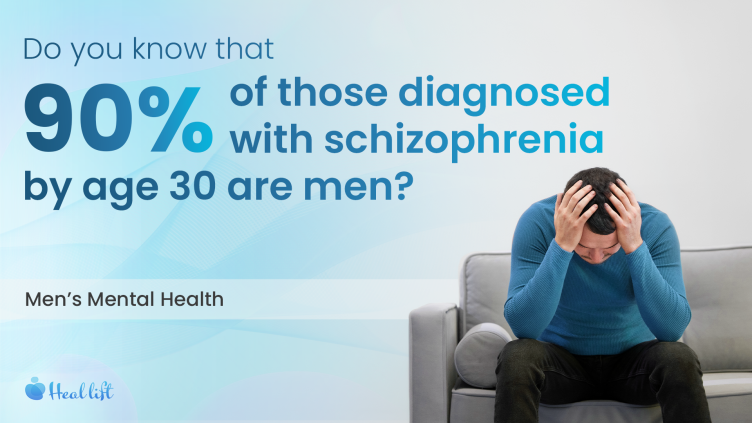HealLift - 07 Aug 2024
76% of Organizations report Employee Absence due to Stress!
Insights from the “Survey Report - September 2023” by the CIPD (UK)

Heal Lift

Yes, people of any gender can be impacted by poor mental health, but men suffer in silence because they are less inclined to confide in others about their emotions due to social ideals of masculinity. This expectation has a negative impact on men's mental health and is a product of toxic masculinity.
In 2021, the overall life expectancy for men dropped from 74.2 years to 73.2 years. To bring this back to mental health, the rate of suicide was the third-most reason for this decline in life expectancy.
Men who weep are frequently derided in the media and on television, but making fun of this normal, human emotional release does more harm by discouraging men from shedding tears and sharing their struggles with others. Men are less likely than women to seek mental health treatment. This is true around the globe over a wide range of races, ethnicities, and socioeconomic classes.
Of men who would consider taking time off from work, 52% would worry about it, and 46% would feel embarrassed or humiliated to notify their employer. (Health Forum for Men)
In the UK, suicide is the main cause of mortality for men under 50. (Silent Zone)
Males account for 75% of suicide deaths in UK and the Centers for Disease Control and Prevention (CDC) states that men account for about 80% of suicide deaths in the United States.
Globally, the World Health Organization (WHO) reports that the suicide death rate among men is double that of women. Furthermore, male suicide rates are higher in high-income countries.
According to Mental Health America (MHA), every year, over 6 million American males suffer from symptoms of depression, the most of which remain misdiagnosed.
According to a 2021 CDC investigation, situational stressors also significantly contribute to suicide fatalities among males, many of whom do not have a history of mental illness.
While the statistics look like that, there are myths about mental health in men. Let us dive into the reality of them.
1. Men don't naturally experience anxiety and depression.
Men are not immune to mental illnesses, even if they seem to affect women slightly more frequently. Approximately 1 in 5 women and 1 in 8 men in England suffered a common mental health problem in 2014.
2. Men aren't supposed to discuss it.
Research demonstrates that men commit suicide at a significantly higher rate than women. Men are more likely to consume drugs as a way to "cope" with depression and other problems.
3. The "baby blues" don't affect men.
Roughly one in ten new moms experience postpartum depression, sometimes referred to as postnatal depression, and other postpartum disorders. Nonetheless, research indicates that 10% of males may also encounter anxiety and melancholy following childbirth.
4. To need assistance is to be weak.
Everyone, regardless of gender, needs support occasionally, and it takes bravery to acknowledge you're hurting when you're used to hiding your troubles. Making the effort to reach out signifies that you are taking responsibility for your mental health, which is just as vital as looking after your physical health.
We cannot forget the terms "toxic masculinity" and "man up" when discussing men's mental health. Toxic masculinity refers to a set of false presumptions about what it means to be "masculine," such as being stoic, displaying no emotion, or acting aggressively and tough rather than being sensitive and soft. Men are frequently advised to "man up" and to hide their troubles, regardless of which gender they confide in. They might even experience peer bullying. This deters them from asking for assistance in the future.
Australian mental health specialist Simon Rice stated in The Lancet Public Health in 2021 that gender differences in mental health typically emerge across late childhood and adolescence. At this point, gender norms also solidify and endure into later life, continuing to influence mental health and the need for assistance.
The same mental health conditions might present in various ways for both genders. Males that suffer from depression could be more irritable, hostile, and angry, or they might express their anguish in other "culturally acceptable" ways. Instead, depressed women may exhibit indicators of poor mood. Men could use alcohol and other drugs as a form of self-medication. But doing so can make existing problems worse and increase their chance of developing new illnesses.
According to academics, raising general awareness and educating people about mental health difficulties is the first step in tackling these problems. Researchers proposed dispelling the stigma in a 2016 Canadian Family Physician piece by starting nationwide initiatives that promote asking for assistance as an essential component of taking care of one's general health.
Addressing men's mental health requires a collective effort to challenge societal norms and dispel damaging myths. The prevalence of toxic masculinity and the expectation for men to adhere to outdated stereotypes hinder their ability to seek help and contribute to alarming rates of suicide and untreated mental health conditions. It is crucial to acknowledge that mental health issues affect men across diverse demographics, and seeking assistance is not a sign of weakness but an act of courage. By fostering open conversations and promoting a culture that encourages seeking support, we can work towards a society where men feel empowered to prioritise their mental well-being without fear of judgement.
Sources
